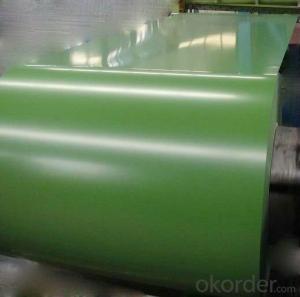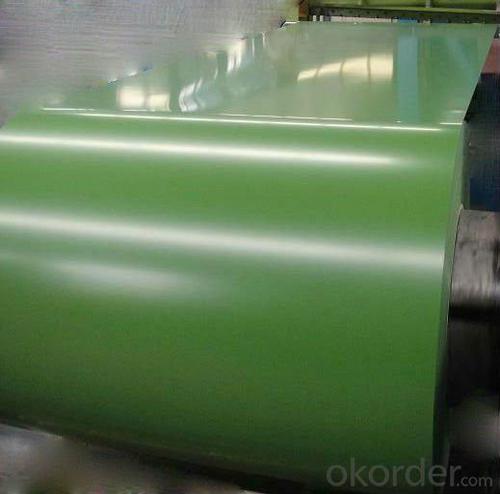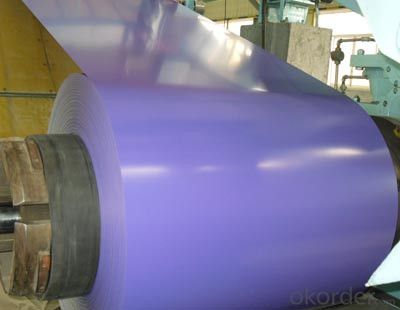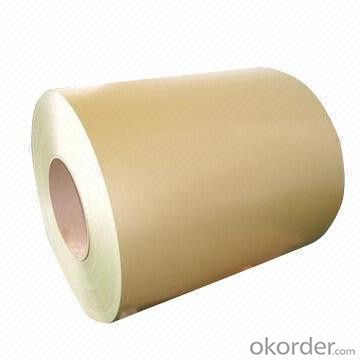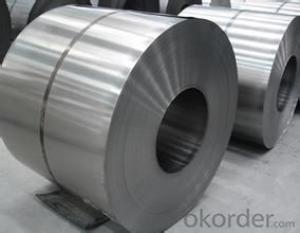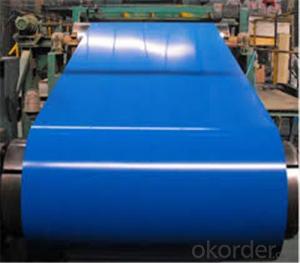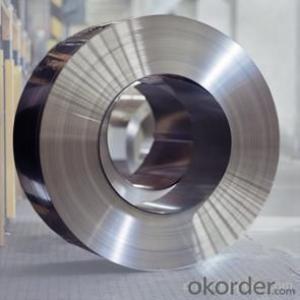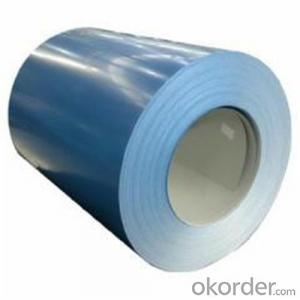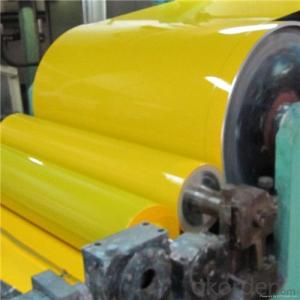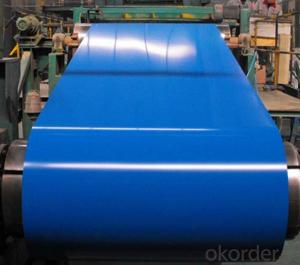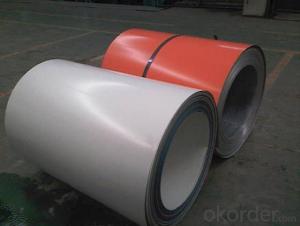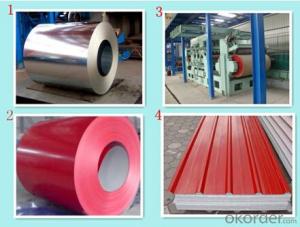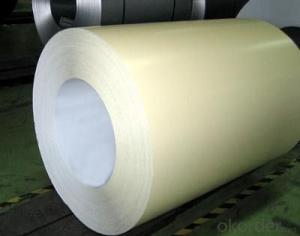Pre-painted rolled Steel Coil for Construction Roofing constrution
- Loading Port:
- Tianjin
- Payment Terms:
- TT OR LC
- Min Order Qty:
- 25 m.t.
- Supply Capability:
- 25 m.t./month
OKorder Service Pledge
OKorder Financial Service
You Might Also Like
Structure of Prepainted Rolled steel Coil for Construction Roofing
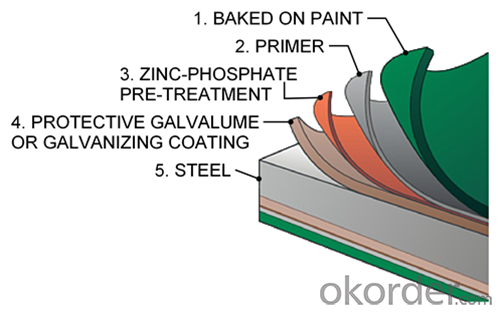
Description of Prepainted Rolled steel Coil for Construction Roofing
Prepainted Rolled steel Coil is a kind of coated steel coil/sheet. With the cold rolled steel of different strength and thickness as substrate, it is produced through applying Al-Zn coat on both faces by hot dip process. In its coating, Al accounts for about 55%, Si 1.6%, while the remaining is Zn. Aluminum zinc coils enjoys both the physical protective feature and durability of Al and the electrochemical protective property of Zn. And its surface has bright silver color and regular embossed-like figure, which are highly decorative.
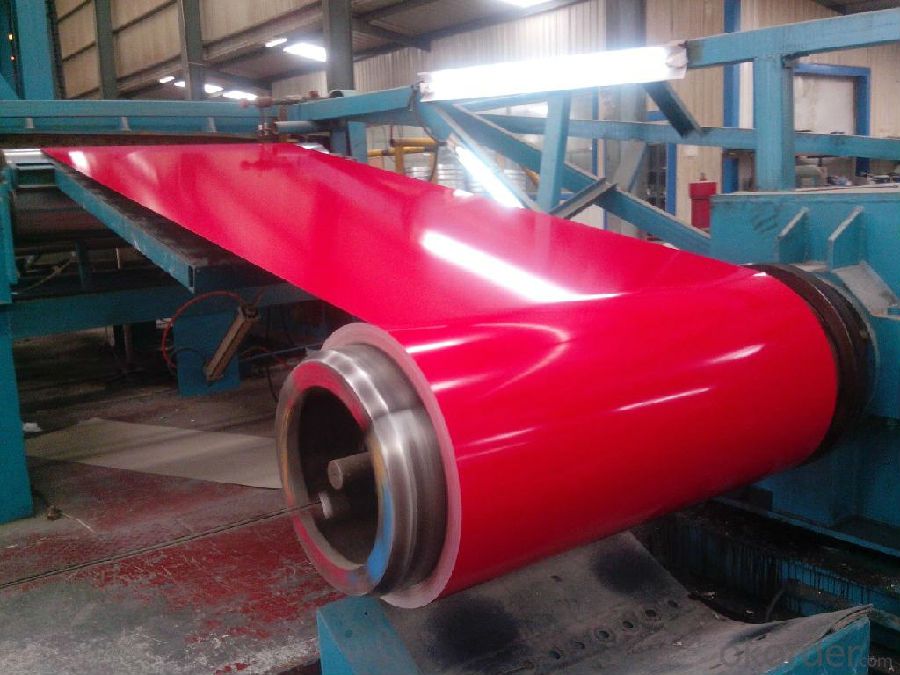
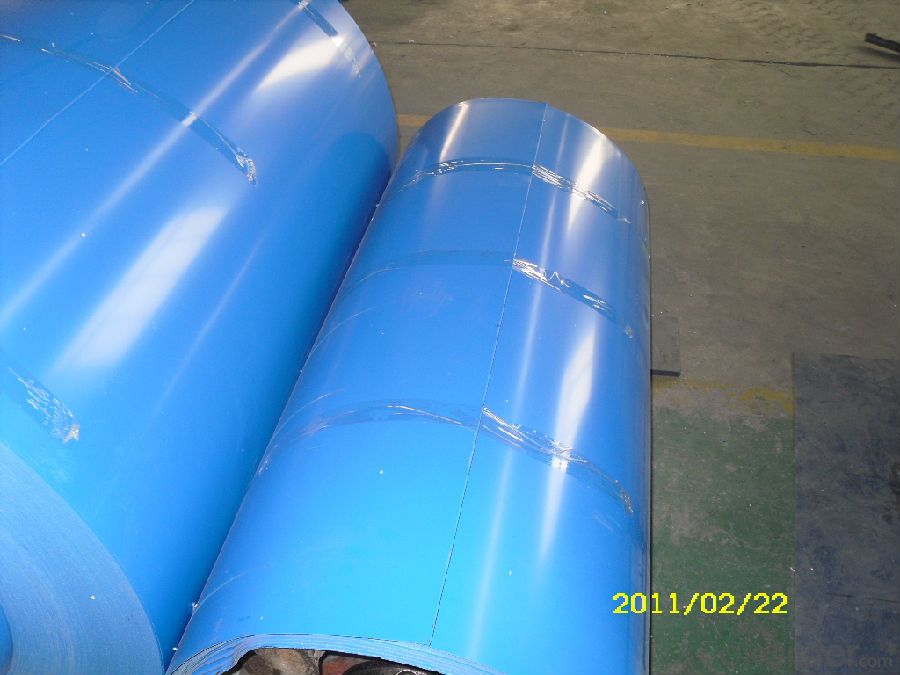
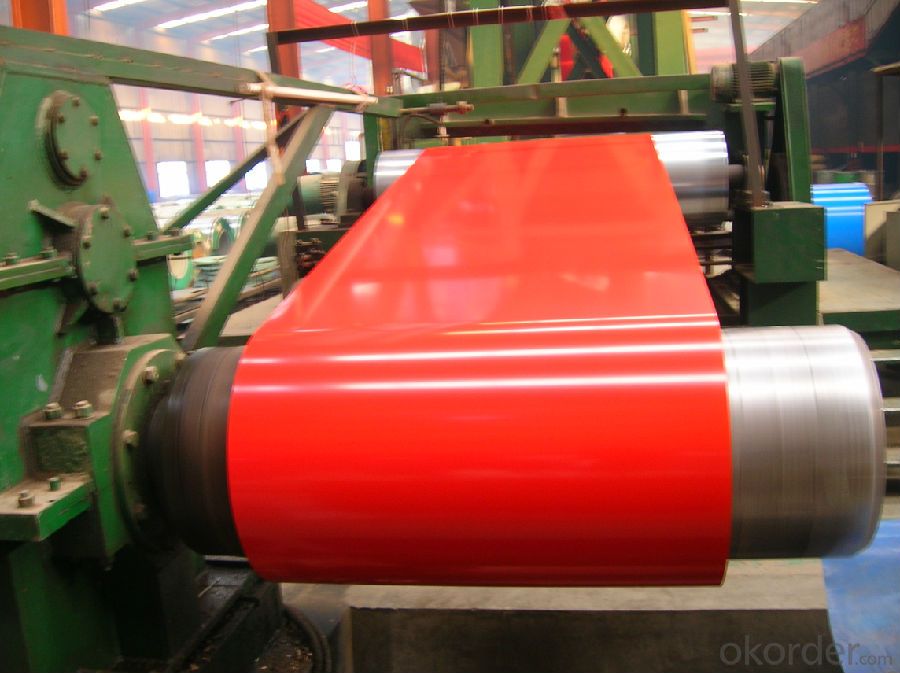
Main Feature of Prepainted Rolled steel Coil for Construction Roofing
1.Corrosion resistance: It mainly depends on the aluminum protection. When the zinc being worn, the aluminum will form a dense layer of aluminum oxide, resist corrosion material to prevent further corrosion inside.
2. Heat resistance: Aluminum zinc alloy steel sheet has excellent heat resistance, can withstand high temperatures over 300 centigrade, and is similar with aluminized steel high temperature oxidation resistance. It often used in chimney pipes, ovens, fluorescent lighting device and the device cover.
3. Heat reflective: Galvanized steel plate heat-reflective high rate is twice as galvanized steel, often used to make insulation materials.
4. Economy: Because density of 55% AL-Zn is smaller than the density of Zn, so in the same weight and thickness of Galvanized zinc layer, aluminum-zinc steel plate is larger area more than 3% of galvanized steel sheet.
Applications of Prepainted Rolled steel Coil for Construction Roofing
1. Construction and building: roofing; ventilating duct; handrail; partition panel;etc.
2. Electric appliance: refrigerator; washing machine; refrigerator; DVD;etc.
3.Transportation: oil tank; road sign; etc.
4.Agriculture:barn; etc.
5.Others:vending machine; game machine; etc.
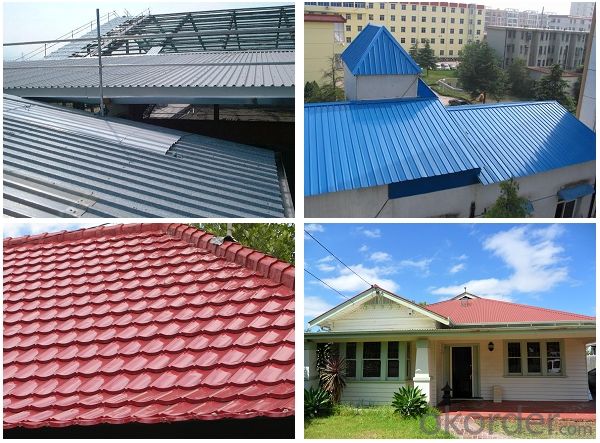
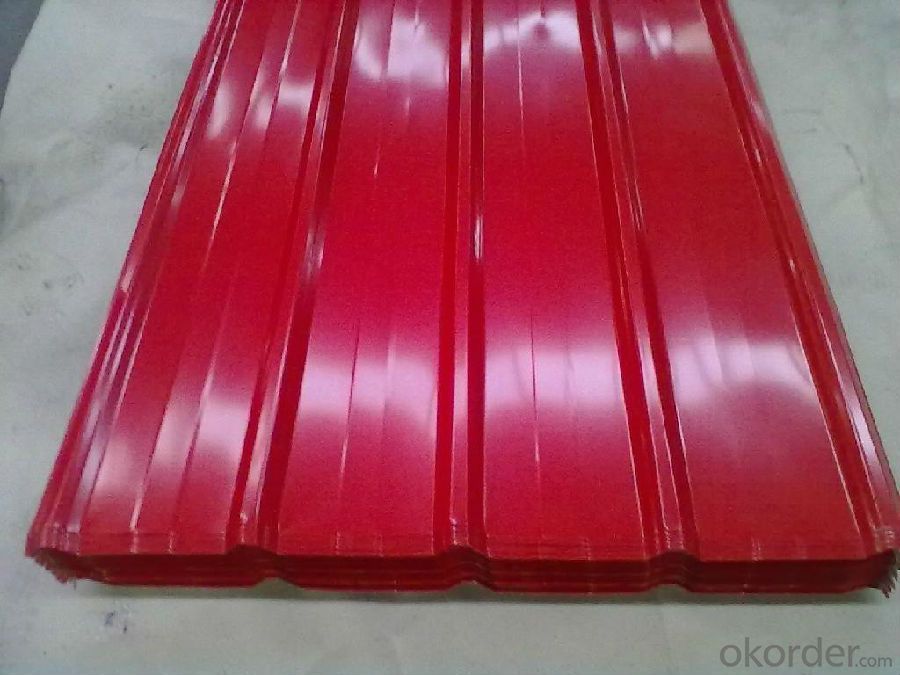
Specifications of Rolled steel Coil for Construction Roofing
Product | Prepainted Rolled steel Coil for Construction Roofing |
Material Grade | SGCC / SGCH / DX51D+AZ, etc |
Thickness | 0.2-3.0mm |
Width | 600-1500mm |
Tolerance | Thickness: +/-0.02mm , Width:+/-2mm |
Zinc-coating | AZ40-150g/m2 |
Technique | Raw material: Hot rolled steel coil --> Cold rolled_>hot dipped galvalume |
Surface | Dried, Chromated, Unoiled |
Spangle | Regular spangle , small spangle, zero spangle |
ID | 508MM |
Coil weight | 10MT max |
Export package | Cardboard inner sleeves, Waterproof paper, galvanized steel covered and steel strip packed |
FAQ of Prepainted Rolled steel Coil for Construction Roofing
We have organized several common questions for our clients,may help you sincerely:
1. What is the minimum order quantity ?
Our MOQ is 50mt for each size. And we will consider to give more discount if you make big order like 1000 tons and more. Further more, the more appropriate payment term your offer the better price we can provide.
2. How long can we receive the product after purchase?
Usually within thirty working days after receiving buyer’s advance payment or LC. We will arrange the factory manufacturing as soon as possible. The cargo readiness usually takes 15-25 days, but the shipment will depend on the vessel situation.
3. How to guarantee the quality of the products?
We have established the international advanced quality management system,every link from raw material to final product we have strict quality test;We resolutely put an end to unqualified products flowing into the market. At the same time, we will provide necessary follow-up service assurance.
- Q: i'm looking into pedal steel guitars, and I would like some suggestions or links and info on what kind i should get.
- Try okorder -The Art of Steel Guitar/ Steel guitar players -Take it away Leon- McAuliffe and 'Speedy West' were a couple greats. In the late '50s, Speedy was playing a Fender 1000 Pedal steel. He often did duets with Jimmy Bryant The Fastest Guitar Player In The Country! / note also the 'Emmons Guitar Company':
- Q: What is the cost of a steel coil?
- The cost of a steel coil can vary depending on factors such as the type and grade of steel, the size and weight of the coil, and market conditions. It is best to contact a supplier or manufacturer for accurate pricing information.
- Q: How are steel coils recycled?
- Steel coils can be recycled through a process that involves melting them down in a furnace, removing impurities, and then shaping the molten steel into new coils or other steel products. This recycling method helps conserve resources, reduce waste, and significantly cut down on energy consumption compared to producing steel from raw materials.
- Q: How are steel coils used in the production of electrical appliances?
- Steel coils are used in the production of electrical appliances as the core component for electromagnets. These coils are wound around a metal core and when an electric current passes through them, they create a magnetic field which is essential for the functioning of various electrical components such as motors, transformers, and solenoids.
- Q: What are the different methods of testing steel coils for quality control?
- There are several methods commonly used to test steel coils for quality control. These methods ensure that the steel coils meet the required specifications and standards. 1. Visual Inspection: This is the most basic method of testing steel coils. It involves a thorough visual examination of the coils for any surface defects such as scratches, dents, or irregularities. Visual inspection helps identify any visible defects in the material. 2. Dimensional Measurement: Another important method is dimensional measurement. This involves using various tools like calipers, micrometers, or laser measuring devices to assess the dimensions of the steel coils. The measurements are compared against the specified tolerances to ensure they meet the required standards. 3. Hardness Testing: Hardness testing determines the resistance of the steel coils to indentation or penetration. It helps assess the strength and durability of the material. Common hardness testing methods include Rockwell, Brinell, and Vickers hardness tests. 4. Tensile Strength Testing: Tensile strength testing measures the maximum amount of tensile stress a steel coil can withstand before breaking or deforming. This test helps determine the strength and elasticity of the material and ensures it meets the required specifications. 5. Chemical Analysis: Chemical analysis involves testing the composition of the steel coils to verify if they contain the desired amount of specific elements. This is crucial for ensuring the coils are made from the correct grade of steel and comply with the required chemical composition standards. 6. Coating Thickness Measurement: In case the steel coils have a protective coating, it is important to measure the thickness of the coating. This is typically done using non-destructive testing methods like magnetic induction or eddy current testing. The coating thickness is compared against the specified requirements to ensure it provides adequate protection. 7. Surface Roughness Measurement: Surface roughness testing assesses the smoothness or roughness of the steel coil's surface. This is done using instruments like profilometers or roughness testers. Surface roughness testing helps ensure the coils meet the required surface finish standards. 8. Ultrasonic Testing: Ultrasonic testing utilizes high-frequency sound waves to detect internal defects such as cracks, voids, or inclusions within the steel coils. It is a non-destructive testing method that provides valuable information about the coil's structural integrity. 9. Magnetic Particle Inspection: This method is used to identify surface and near-surface defects in steel coils. Magnetic particles are applied to the surface, and any magnetic leakage caused by defects is detected using magnetic sensors. This technique is particularly effective for detecting cracks and other surface abnormalities. By employing a combination of these testing methods, manufacturers can ensure that the steel coils produced meet the required quality standards and are suitable for their intended applications.
- Q: PLS tell me all Foam Steel Characteristics and use?Thanks
- Foam steel [often steel foam] is used in applications that require light weight but high rigidity and strength. Watertight doors on modern ships are often made of foam steel. Pressure doors on aircraft are possible uses. As we keep striving for lighter weights in cars, foam steel might have some useful applications in bodies. There is a technical paper online that is in .pdf format that has a good discussion of the process and characteristics of foam steel.
- Q: i would like to know of any companies who buy shredded scrap steel
- We are one of the biggest steel mills in Asia. Under our group, we have steel mills in Thailand and Bangladesh. On the monthly basis, we purchase steel scrap HMS1/2 80:20 and the shredded ISRI210/211, ISRI211 by bulk and 20' container to Thailand and Bangladesh. Due to the limitation of our existing shredded steel scrap supplier, we need to get more supply of the shredded. Please contact us or offer us of ISRI 210/211 or ISRI211 CFR Chittagong, Bangladesh with 500mt - 2000mt per shipment by 20' container. If any questions, please feel free to contact us.
- Q: I just got the game Red Steel for the Wii. I want to use the sword in multiplayer mode, but I can't find it. Is it only for single player?
- Sure.
- Q: How do steel coils contribute to energy savings in buildings?
- Steel coils contribute to energy savings in buildings in several ways. Firstly, steel coils are often used as part of the insulation system in buildings. The high thermal conductivity of steel allows for efficient heat transfer, ensuring that the building remains well-insulated and energy loss is minimized. Additionally, steel coils are often used for HVAC systems, which play a crucial role in energy efficiency. By using steel coils in these systems, the heat transfer process can be optimized, reducing the energy required to heat or cool the building. Moreover, steel coils are durable and long-lasting, reducing the need for frequent replacements and maintenance, which in turn saves energy and resources. Overall, the use of steel coils in buildings helps to improve energy efficiency and reduce energy consumption, contributing to significant energy savings.
- Q: What is the material of steel coil 08F and what brand can be used instead?
- The high quality carbon structural steel, carbon steel, steel commonly referred to as. Steel for the manufacture of parts for various machines.1.08 and 08F steel is used for rolling thin plates, deep drawing products, oil drums and high-grade enamel products. It can also be used for the manufacture of pipes, gaskets and core parts with low strength requirements, carburizing and cyaniding parts, welding electrodes and so on.2.10 and 10F steel, use cold pressing deep drawing products below 4mm, such as deep drawing vessel and shell. It can also make boiler tubes, oil drum covers and steel strips, steel wires, welding pieces and mechanical parts.3.15 and 15F steel are used to make carburizing parts, fastening parts, die forging parts and low load parts without heat treatment, such as bolts, screws, flanges and storage tanks for chemical machinery, steam boilers, etc..
Send your message to us
Pre-painted rolled Steel Coil for Construction Roofing constrution
- Loading Port:
- Tianjin
- Payment Terms:
- TT OR LC
- Min Order Qty:
- 25 m.t.
- Supply Capability:
- 25 m.t./month
OKorder Service Pledge
OKorder Financial Service
Similar products
Hot products
Hot Searches
Related keywords
